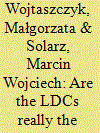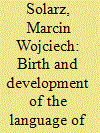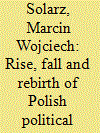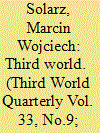| Srl | Item |
| 1 |
ID:
152078


|
|
|
|
|
| Summary/Abstract |
The term ‘the least developed countries’ (LDCs) is widely understood to designate, exactly as stated, the world’s least developed countries. In conjunction with the 2015 United Nations (UN) triennial review of the LDC category, this article attempts to critically evaluate the UN’s list of LDC countries in the light of various indicators – economic, social, political, military and security related, and psychological. It concludes that the official and actual lists of LDCs, despite important similarities, are not completely identical. The term ‘the LDCs’ as used by the UN is therefore not fully consistent with the reality it attempts to designate and describe.
|
|
|
|
|
|
|
|
|
|
|
|
|
|
|
|
| 2 |
ID:
153138


|
|
|
|
|
| Summary/Abstract |
The 1940s saw an intensification of worldwide interest in the problems of development and underdevelopment. One consequence of this was a rapid evolution of the language of global development. The reconstruction of its genesis is most commonly attempted through the analysis of literature on the subject and accounts by those who took part in or observed the debates of the time concerning the world’s development and structure. This article proposes a different approach which locates important events in the evolution of the modern language of global development on timelines tracing populational, political, socio-economic and civilisational processes.
|
|
|
|
|
|
|
|
|
|
|
|
|
|
|
|
| 3 |
ID:
134635


|
|
|
|
|
| Summary/Abstract |
The article presents an outline of the history of Polish political geography. Its development as a science in fact began in the nineteenth century and its golden age lasted all the way through to the fall of the Polish state in 1939. The loss of independence in the period 1939/1945–1989 also brought with it the fall of political geography in Poland. After 1989, along with the restoration of freedom of research in Poland, a new period started in the history of Polish political geography
|
|
|
|
|
|
|
|
|
|
|
|
|
|
|
|
| 4 |
ID:
116841


|
|
|
|
|
| Publication |
2012.
|
| Summary/Abstract |
The term 'Third World' was coined in 1952 by the French scientist Alfred Sauvy. From the start the meaning of both the phrase itself and its geographical reference have been ambiguous. Generally speaking the term has always had both a political and a socioeconomic meaning, even though at first, during the Cold War, the political sense was more widely applied. The term gained popularity quickly and it became one of the most important and expressive concepts of the 20th century. From the very beginning, however, it was strongly criticised. Its critics have pointed out many different problems, which is why some people have argued that the notion of the 'Third World' should be abandoned. These voices were particularly widespread after the end of the Cold War. Nevertheless, the concept 'Third World' is still valid and it remains one of the most frequently used terms for describing the global South. The factors that made the concept of the 'Third World' popular are still valid.
|
|
|
|
|
|
|
|
|
|
|
|
|
|
|
|